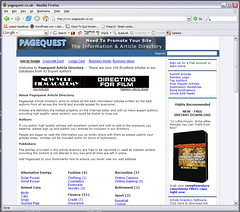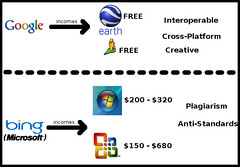 Image via CrunchBase
Image via CrunchBaseHow to Migrate Your Entire Google Account to a New One
Source: lifehacker.com
Whether you finally decided to shed sassyhacker957@gmail.com for a more professional handle or you want to swap Google accounts for less embarrassing reasons, Google doesn't have a built-in system for migrating your data to a new account.
A lot of us have a ton of data stored in Google's services, but if you want to migrate to a new Google account, you'll need to do some digging.
Here's how to migrate your data from Google's most popular services (Gmail, Google Calendar, Docs, Reader, Voice, Blogger, and YouTube) from your current account (hereafter referred to as "Account 1") to your new account (hereafter, "Account 2") while incurring the least amount of data loss.
A few of the services (such as Google Reader) adhere to some fairly universal import/export standards that make it easy, whereas other services (such as newer YouTube accounts) may require you to start from scratch to keep full functionality.
In these few cases, we'll note what you can do and what you'll lose by using that method instead of starting over.
Note: Unfortunately, Google Apps has still not caught up to regular Google Accounts in terms of available services.
While some of these (such as Calendar and Documents) will work for migrating to a Google Apps account, other services (such as Reader or Voice) are still not available to Google Apps at this time.
I'll note where the service is not available to Apps users, as well as when they need to go through a different process of migrating that particular service.Image via CrunchBase
Migrating Gmail
Migrating all your email from one Gmail account to another is a fairly involved process---and one which we detailed in our guide to changing your Gmail account without losing your email.
So hit up that original guide for your Gmail migration, then come back for the rest.Google Calendar
There are two ways to migrate your Google Calendar.
One of them takes a bit longer, but we'll only use that method for your main calendar (the one that, by default, is named after your Gmail address).
All of the sub-calendars, or "delegates", of the account are easier to migrate, so we'll do that second.
To migrate your main calendar, go into your Google Calendar settings and click on the Calendars tab.
You'll see an option to export all your calendars, at once, to your hard drive in iCalendar format.
Export them to your drive and unzip them if necessary.
Next, go to your new account (it's easiest to have each account logged into Google in a separate browser), go to Settings> Calendar Settings> Calendars and create a new one.
Name it whatever you like, click Create Calendar, and then hit the import button at the bottom of the page.
Choose the .ical file corresponding to your main calendar and upload it, choosing the empty Google Calendar you just created as its destination.
You'll see that it shows up in calendar view.
If you have more calendars you want to import beyond the default, we're just going to share them with the other account.
Go back to the Calendars tab of Account 1's settings and hit the "Share This Calendar" button next to a calendar.
Type in the Account 2's address and hit Enter.
Change the permissions in the drop-down window to "Make Changes AND Manage Sharing" and hit Save.
Account 2 will receive an email saying that you've shared a calendar, and provide a confirmation link.
The first time you receive an invitation, you'll need to click on this link, but afterward the calendar will just show up automatically.
You can then go back to the Calendars tab of your new account's settings, hit the "Shared: Edit Settings" link and remove Account 1 at the bottom, by clicking the trash can icon.
(This removes Account 1 from sharing the calendar, so Account 2 is left with full ownership of the calendar.)
Repeat this for each of your calendars and you'll have migrated everything you need.
This method works for both regular Google accounts as well as Google Apps.Image via CrunchBase
Google Docs
If you're migrating to a regular Google account, transferring your Google Docs is easy.
Just select all the documents you want to migrate, go to the More Actions drop down menu, and choose Change Owner.
Type in Account 2's address in the box that comes up.
You'll see all your documents in Account 2.
Unfortunately, Google Docs does not allow you to change the owner to someone of a different domain, meaning migrating your documents to a Google Apps account takes a bit longer.
Select all the documents you want to transfer, go to the More Actions drop down, and click on Export.
This will compress all the documents into a zip file and download it to your hard drive.
Afterward, you can go to Account 2 and hit the Upload button in the top left corner, and choose all the documents you just downloaded.
It'll take a bit longer, but you still won't lose any functionality or data, which is nice.
Note that any documents for which you are a collaborator but not the owner will not transfer correctly with either of these methods; you'll need to contact the owner of those documents and tell them to re-share them with your new account.Google Reader
Migrating your RSS feeds is probably the easiest part of this process, but it unfortunately only works with regular Google accounts (since Apps accounts do not have access to Reader).
Just go into Google Reader's settings and click on the Import/Export tab.
At the bottom, you'll see a link that says "Export Your Subscriptions as an OPML File" which will download a single file to your computer containing all of your feeds.
Click on this link, and then go to the same Import/Export tab in Account 2's Settings.
This time, click the Choose File button and navigate to the file you just downloaded.
After uploading this file, all your feeds should show up in Reader.
Note that this won't sync your read and unread counts, nor will it sync your starred or shared articles, so you'll have to re-star anything you still want to reference (and re-friend anyone you follow on Reader).Image via CrunchBase
Migrating Blogger
Migrating your Blogger account will be similar to Calendar and Docs, but with a few caveats.
Sign into your current Blogger account, go to Settings, and hit the Permissions tab.
Click the Add Authors button and type in Account 2's address.
You'll get an email notification in that account's inbox, so head over to your other browser and accept the invitation to become an author of that blog.
Once you've done so, you can remove Account 1 from the blog by clicking the remove link next to its address.
Note that when you do this, Account 1's posts will stay up as they were before.
However, if you delete your original Google account, all the pictures will turn into broken images.
You could re-upload and re-post all the pictures, but honestly, there's no reason to delete the account outright, even if you never plan on using the Gmail address again.
In fact, I've found that having an old Google Account makes a handy address to direct all your spam.
Unfortunately, you can only migrate your YouTube account if you created it before May 2009.
If you are one of these lucky folks, though, it's quite easy.
When GrandCentral became Google Voice, Google provided a path for users to switch accounts since many people associated their GrandCentral account with the wrong Google Account.
Send an email to Whitson Gordon, the author of this post, at whitson@lifehacker.com.




![Reblog this post [with Zemanta]](http://img.zemanta.com/reblog_b.png?x-id=5540f3d6-9d40-4cda-bed2-82753eb67172)
![Reblog this post [with Zemanta]](http://img.zemanta.com/reblog_b.png?x-id=3f05c656-36e9-4233-830d-e89d1d6731be)

![Reblog this post [with Zemanta]](http://img.zemanta.com/reblog_b.png?x-id=05198c4f-5ea1-42f6-bd50-950d769a2c83)

![Reblog this post [with Zemanta]](http://img.zemanta.com/reblog_b.png?x-id=be9ae7b0-5349-44d7-a680-5feb83a7f0e0)

![Reblog this post [with Zemanta]](http://img.zemanta.com/reblog_e.png?x-id=733e9298-41be-41ed-a191-66f2e4dffd78)